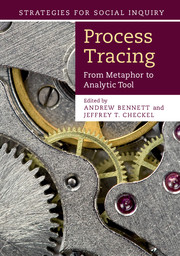Book contents
- Frontmatter
- Contents
- List of figures
- List of tables
- List of contributors
- Preface
- Part I Introduction
- Part II Process tracing in action
- 2 Process tracing the effects of ideas
- 3 Mechanisms, process, and the study of international institutions
- 4 Efficient process tracing
- 5 What makes process tracing good?
- 6 Explaining the Cold War’s end
- 7 Process tracing, causal inference, and civil war
- Part III Extensions, controversies, and conclusions
- Appendix Disciplining our conjectures
- References
- Index
6 - Explaining the Cold War’s end
Process tracing all the way down?
Published online by Cambridge University Press: 05 November 2014
- Frontmatter
- Contents
- List of figures
- List of tables
- List of contributors
- Preface
- Part I Introduction
- Part II Process tracing in action
- 2 Process tracing the effects of ideas
- 3 Mechanisms, process, and the study of international institutions
- 4 Efficient process tracing
- 5 What makes process tracing good?
- 6 Explaining the Cold War’s end
- 7 Process tracing, causal inference, and civil war
- Part III Extensions, controversies, and conclusions
- Appendix Disciplining our conjectures
- References
- Index
Summary
The fall of the Berlin Wall. The Soviet defeat in Afghanistan. The introduction of glasnost and competitive elections in the USSR. The withdrawal of Soviet armed forces from Central Europe. Such events have come to represent the end of the Cold War. Historians might not agree on precisely when the military–political–economic rivalry between the United States and the Soviet Union and their respective allies – and the attendant risk of global nuclear war – ended. They are left, instead, to explain the events that culminated in the undisputed demise of that rivalry. Political scientists’ explanations for the end of the Cold War – a shift in the balance of power, the impact of economic globalization and relative Soviet decline, the normative appeal of democracy and capitalism – are, however, not well suited to explain events. Process tracing provides a way to evaluate explanations for the end of the Cold War by linking broad theories to specific events. The method depends on identifying evidence on the mechanisms behind the decisions of political leaders – something that the available archival record in many cases allows.
As the volume’s editors point out in Chapter 1, this chapter differs from the others in that it does not seek to demonstrate the usefulness of process tracing for a particular domain of political science or how process tracing in one case can help evaluate the merits of a given theory more broadly. Scholars have used the case of the Cold War’s end in this way – for example, to illustrate the impact of economic globalization on security (Brooks 2005), the factors influencing states’ grand strategies (Evangelista 1993), and the conditions under which states pursue conflictual or cooperative security policies (Evangelista 1991). Indeed, process tracing has proved an effective method for evaluating competing theories of international relations applied to particular developments during the Cold War – from military intervention to arms control to the basic ideas underpinning foreign policy (for example, Bennett 1999; Checkel 1997; English 2000; Evangelista 1999; Mendelson 1998).
- Type
- Chapter
- Information
- Process TracingFrom Metaphor to Analytic Tool, pp. 153 - 185Publisher: Cambridge University PressPrint publication year: 2014
- 4
- Cited by



